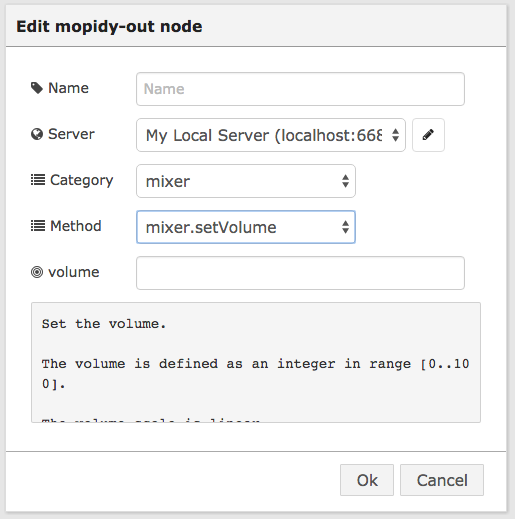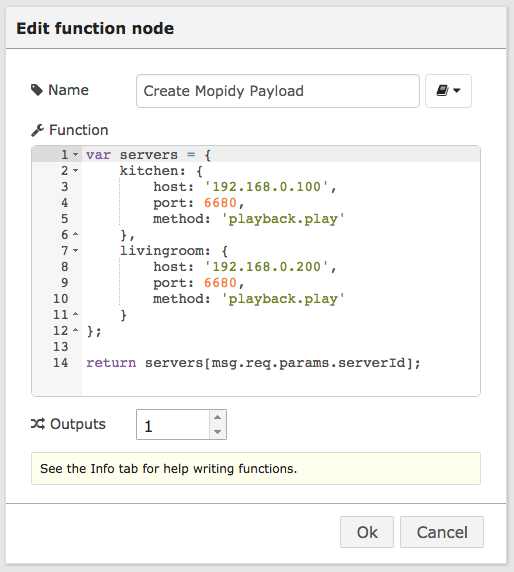
Security News
PyPI Now Supports iOS and Android Wheels for Mobile Python Development
PyPI now supports iOS and Android wheels, making it easier for Python developers to distribute mobile packages.
node-red-contrib-mopidy
Advanced tools
Control your Mopidy Servers from Node-RED

This module enables you to control your Mopidy servers from Node-RED. This means that you - from Node-RED - can play all kinds of music, be it files on disk or streamed from Spotify, SoundCloud, Google Play Music or others.
Possible use cases:
Mopidy is a "headless" music server, easy installed on a Raspberry Pi/Mac/Linux machine.
cd $HOME/.node-red
npm install node-red-contrib-mopidy
With version 2.0.0, this module was completely rebuilt, based on the idea of the v0.9.0 proof of concept. Laurence gracefully transfered the npm namespace node-red-contrib-mopidy to this new module. See the CHANGELOG for access to older versions.
There are 2 nodes included in this package; mopidy-out and mopidy-in. The out node allows you to send a message to a Mopidy server (like "Run playlist: Afternoon tea"). The in node allows you to listen to changes on a Mopidy server (like "Stream Title Changed").
The Mopidy-out node is your way of sending commands ("play this", "add that", "mute", "create a new playlist", etc) to a Mopidy server. When configuring a Mopidy-out node you can browse all possible actions:

A Mopidy-out node will run on any input. As the Mopidy-out node always send an output, this means that you can chain nodes. The example below will first clear all tracks in the tracklist, then add a track (in this case a URL to a Swedish web radio), and finally press play.

[{"id":"891849ea.76e7b8","type":"mopidy-config","name":"My Local Server","host":"localhost","port":"6680"},{"id":"b7a1752c.485e88","type":"mopidy-out","name":"","server":"891849ea.76e7b8","params":"{}","method":"tracklist.clear","x":581,"y":253,"z":"6e174afa.91e8b4","wires":[["69fdd828.960228"]]},{"id":"205ce862.dfa318","type":"inject","name":"Play","topic":"","payload":"","payloadType":"date","repeat":"","crontab":"","once":false,"x":431,"y":253,"z":"6e174afa.91e8b4","wires":[["b7a1752c.485e88"]]},{"id":"69fdd828.960228","type":"mopidy-out","name":"","server":"891849ea.76e7b8","params":"{\"tracks\":\"\",\"at_position\":\"\",\"uri\":\"http://http-live.sr.se/p1-mp3-128\",\"uris\":\"\"}","method":"tracklist.add","x":744,"y":253,"z":"6e174afa.91e8b4","wires":[["1f1c6aa0.e0e395"]]},{"id":"1f1c6aa0.e0e395","type":"mopidy-out","name":"","server":"891849ea.76e7b8","params":"{\"tl_track\":\"\",\"tlid\":\"\"}","method":"playback.play","x":905,"y":253,"z":"6e174afa.91e8b4","wires":[[]]}]
Typically you will set the server host/port, the method (e.g. setVolume) and possible parameters (e.g. volume: 100) when configuring the node. However, you may also send this data in to the node. Any data you send in to the node will be merged (and override if duplicate) with the configuration on the node.
host, port, method and params properties are valid input to a Mopidy-out node. Can best be described with the example below:
{
host: '192.168.0.200',
port: 6680,
method: 'mixer.setVolume',
params: {
volume: 100
}
}
Here's a flow which will listen to a http request on /<serverId>/play and when that URL is requested it will translate the serverId to data sent into the Mopidy-out node which will play the music.

The (orange) function looks like this:

Flow:
[{"id":"f9cf36ea.0630c8","type":"http in","name":"","url":"/:serverId/play","method":"get","swaggerDoc":"","x":399,"y":387,"z":"6e174afa.91e8b4","wires":[["8cc2806f.733d8","c5057513.3afa88"]]},{"id":"8cc2806f.733d8","type":"function","name":"Create Mopidy Payload","func":"var servers = {\n kitchen: {\n host: 'localhost',\n port: 6680,\n method: 'playback.play'\n },\n livingroom: {\n host: '192.168.0.200',\n port: 6680,\n method: 'playback.play'\n } \n};\n\nreturn servers[msg.req.params.serverId];","outputs":1,"noerr":0,"x":615,"y":387,"z":"6e174afa.91e8b4","wires":[["890a33a0.76f5d"]]},{"id":"890a33a0.76f5d","type":"mopidy-out","name":"Play","server":"","params":"{}","method":"","x":791,"y":387,"z":"6e174afa.91e8b4","wires":[[]]},{"id":"c5057513.3afa88","type":"http response","name":"","x":565,"y":425,"z":"6e174afa.91e8b4","wires":[]}]
When invoked, a Mopidy-out node will output whatever message Mopidy returns.
Example output when invoked with tracklist.add, adding a streaming URL - The Mopidy server returns a bit of data:
{
"payload": [{
"__model__": "TlTrack",
"tlid": 18,
"track": {
"__model__": "Track",
"bitrate": 128000,
"comment": "p1-mp3-128",
"name": "Sveriges Radio P1",
"uri": "http://http-live.sr.se/p1-mp3-128"
}
}],
"serverName": "My Local Server"
}
If a host and/or port is sent in to a Mopidy-out node, the same host/port is sent out from that node. This means that you can set the host/port once and then chain Mopidy-out nodes together. Example (invoked with playback.getState):
{
"payload": "playing",
"serverName": "temporaryServerConnection",
"host": "localhost",
"port": 6680
}

The Mopidy-in node will listen to event sent by a Mopidy server and relay them to Node-RED. This way you can do stuff like update a LED screen when the track changes.
You can configure the Mopidy-in node to listen to different types of events:
The message outputed from the mopidy-in node will differ depending on the event. However, they'll all have the property event which is identifying what kind of event it is.
Example message when playback has been stopped:
{
"event": "event:playbackStateChanged"
"old_state": "stopped",
"new_state": "playing",
}
Example message when the playback of a stream has been started:
{
"event": "event:trackPlaybackStarted",
"tl_track": {
"__model__": "TlTrack",
"tlid": 1,
"track": {
"__model__": "Track",
"bitrate": 128000,
"comment": "p1-mp3-128",
"name": "Sveriges Radio P1",
"uri": "http://http-live.sr.se/p1-mp3-128"
}
}
}
By default, the Mopidy-out node tries to connect to a Mopidy server for 5 seconds before returning a "could not connect" message. If you want to change this, add the following to your Node-RED configuraiton file (easiest found by looking at the console when starting Node-RED):
functionGlobalContext: {
mopidyConnectTimeout: 5
}
This is coded in ES2015/ESNext. To make older node able to understand it, it has to be transpiled to ES5. This is done automagically on installation. To rebuild it yourself, please see the tasks below. The source lives in the ./src folder and gets transpiled and copied to the ./mopidy folder.
There's a pre-commit hook in place which will run tests and lint check (npm test and npm runt lint) on commit. Failed tests or lints will prevent commit. Nota bene: The commit hook runs the integration tests which require an Mopidy server to connect to.
Run tests which do not require a connected Mopidy server by running:
npm test
Run integration tests which do require a connected Mopidy server. By default it looks for a Mopidy Server running on localhost:6680. This can be changed by setting the envionment variables MOPIDY_TEST_HOST and MOPIDY_TEST_PORT.
npm run test-all
For linting with eslint, run
npm run lint
To auto-run babel and transpile ES2015 to ES5 when files are changed (and copy all non-js files from /src to /mopidy if they're changed), run:
npm run watch
To do a complete clean & rebuild, run:
npm run clean-build
FAQs
A Node-RED node to communicate with Mopidy
The npm package node-red-contrib-mopidy receives a total of 8 weekly downloads. As such, node-red-contrib-mopidy popularity was classified as not popular.
We found that node-red-contrib-mopidy demonstrated a not healthy version release cadence and project activity because the last version was released a year ago. It has 2 open source maintainers collaborating on the project.
Did you know?

Socket for GitHub automatically highlights issues in each pull request and monitors the health of all your open source dependencies. Discover the contents of your packages and block harmful activity before you install or update your dependencies.

Security News
PyPI now supports iOS and Android wheels, making it easier for Python developers to distribute mobile packages.

Security News
Create React App is officially deprecated due to React 19 issues and lack of maintenance—developers should switch to Vite or other modern alternatives.

Security News
Oracle seeks to dismiss fraud claims in the JavaScript trademark dispute, delaying the case and avoiding questions about its right to the name.